Can dogs eat cheese?
Can dogs eat cheese?
When it comes to feeding your dog human foods, there’s rarely a straightforward answer as to whether or not it’s allowed. Some foods are okay, some are okay when cooked, and others that seem harmless or even healthy can have devastating effects.
So if you’re thinking of sharing a nibble of cheese with your dog, you’d be right to do some research first. Dairy isn’t a natural part of a dog’s diet, so it seems like cheese would be a food best avoided. But in fact, a bit of cheese now and then won’t do your dog any harm.
In this blog, we’ll explain when dogs can eat cheese, the benefits of different kinds of cheese for dogs, and when cheese and lactose are best avoided.
Can I feed my dog cheese?
Like humans, dogs can have trouble digesting cheese and lactose. However, if your dog is not lactose intolerant or allergic to dairy, you can feed them cheese. Puppies especially love cheese and often respond well to it as a treat during training.
However, as it’s high in fat you should avoid feeding your dog too much and save it for an occasional treat.
Which types of cheese can dogs eat?
Due to its high salt and fat content, cheese isn’t an especially healthy option for dogs – even though it’s unlikely to do them harm if they’re tolerant. So if you’re going to feed it to your dog, it’s best to stick to low-fat types so you can keep an eye on their calories.
Stick to these kinds of cheese when feeding it to your dog as a treat:
- Cottage cheese
- Plain cream cheese
- Gouda
- Edam
- Cheddar
- Red Leicester
However, dogs should never eat blue cheese, as they contain the fungus Roquefortine C that can cause illness. Similarly, any cheese containing garlic or onion should be avoided as allium plants are toxic to dogs. If your dog eats these and then displays a high temperature, diarrhea or vomiting, or seizures they should be taken to the vet immediately.
Health benefits of cheese for dogs
Though high in fat and salt, there are a number of nutritional benefits that dogs can take from cheese. It’s rich in Vitamin A, Vitamin B-complex, calcium, protein, and essential fatty acids. All of these nutrients are essential for dogs – however it’s likely that they’ll get them from their regular diet and don’t need to rely on treats for their intake.
If your dog takes any medication in the form of pills, cheese can be an easy way to conceal them and feed it to them as a ‘treat’.
When should dogs not eat cheese?
If you’ve noticed your dog is gaining weight – whether as a result of eating extra snacks or otherwise – then you should hold back from feeding them high-fat snacks or treats. As well as the issues connected with obesity in dogs, they could develop pancreatitis.
- If your dog is lactose intolerant or allergic to dairy, cheese should always be avoided.
- If your dog has kidney disease they should avoid cheese due to its high salt content.
- If your dog has an upset stomach or has digestive issues, cheese should be avoided as it can lead to sickness and diarrhea.
Cheese should only be fed to dogs alongside an otherwise healthy and well-balanced diet. Front of the Pack’s air-dried dog food is made with 100% natural ingredients that are pure and healthy enough for humans to eat, too (though you probably won’t find it as tasty as cheese)!
Air drying locks in all the goodness of the fresh ingredients so you know your pup is getting everything they need from their main meals. And if you choose to give them a cheeky, cheesy treat on the side then it’s a win, win for them.
